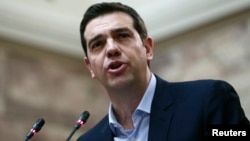Greece and its European Union partners are expected to compromise on Athens' debt bailout program, despite tough talks and an ultimatum Monday in Brussels.
On Tuesday, both parties toned down, saying they are willing to resume talks.
A compromise is what the markets want to see, said a Merit Securities economic analyst in Athens, Nikos Kafkas.
“A compromise, a compromise in the first phase, because this will mean that an accident will be avoided, which is possible. So if the word 'accident' drops out of the equation then investors in the first phase will see the situation more positively, regardless of whether the negotiations last a little longer," said Kafkas.
Dutch Finance Minister Jeroen Dijsselbloem, who chairs the group of his eurozone’s counterparts, said Greece had until Friday to request an extension of its bailout, but expressed readiness to work with the Greek government toward a deal.
Greek Finance Minister Yanis Varoufakis, who stayed in Brussels for a routine eurozone finance ministers meeting, voiced confidence a deal of different terms is possible within days.
The bailout deal of more than $273 billion that Greece received from the Eurozone countries and the International Monetary Fund is due to expire February 28.
If a compromise or an interim solution is not reached Greece could be forced out of the Eurozone.
The comments came a day after crunch talks with euro zone partners broke down in acrimony and raised the risk of Greece facing a full-blown crisis that could force it to impose capital controls or put it on the path out of the euro.
Attacking developments at the meeting, Tsipras said the Greek side was made aware of a common statement that would be adopted that it was willing to accept before it was abruptly changed 15 minutes before the meeting started to a text that Athens strongly disagreed with.
That "provocative'' statement showed that there were European circles that wanted to undermine the Greek government, he said.
Tsipras also took aim in his speech at German Finance Minister Wolfgang Schaeuble, who has been unbending in his opposition to Greek plans to ditch austerity.
"German Finance Minister [Wolfgang] Schaeuble yesterday lost his cool. Not because he spoke up against the Greek government because that is his right, but he spoke condescendingly towards the Greek people,'' Tsipras said.
"I want to say that it would be better for him to pity people who walk with their heads bowed ... not to pity people who hold their heads up high with pride.''
Tsipras said, however, that a cartoon in a pro-Syriza newspaper depicting Schaeuble as a Nazi did not represent his government's views.
Ultimately, a deal to rescue Greece would be found by European leaders rather than "technocrats,'' Tsipras said, in a sign that Athens is waiting for heads of state to step in to resolve the bitter dispute that has so far been tasked to euro zone finance ministers.
Tsipras stormed to power late last month on a pledge to end austerity and cancel a bailout program that many Greeks blame for driving up unemployment and eroding their living standards.
"For us it is a moral and humanitarian priority to repay the debt to the people who suffer, this is our primary debt,'' Tsipras said.
Some information for this report came from Reuters.





